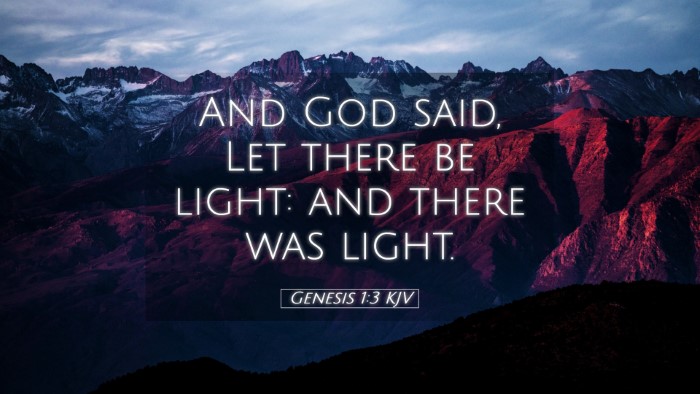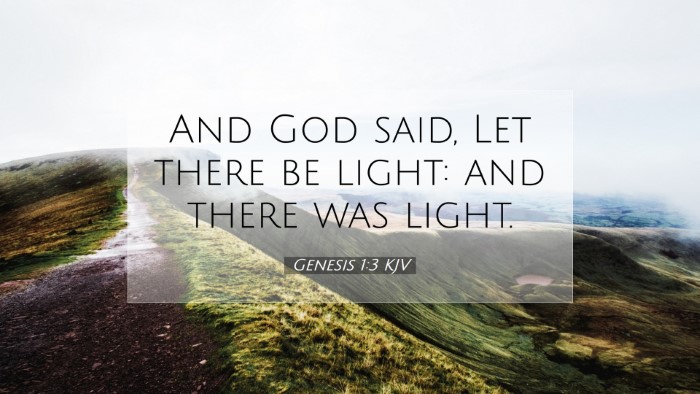Commentary on Genesis 1:3
Verse: "And God said, Let there be light: and there was light." (Genesis 1:3)
Introduction
Genesis 1:3 stands as a pivotal moment in the creation narrative, encapsulating the power of God's word. This verse not only marks the introduction of light but also serves to illustrate the creation process itself—ex nihilo, or out of nothing. Throughout church history, various theologians have expounded on its profound implications.
The Authority of God's Word
Matthew Henry reflects on the creative command of God, emphasizing that when God speaks, creation must yield. The phrase "Let there be light" demonstrates divine authority; it is not a suggestion but a command that brings forth existence from non-existence.
- Divine Command: God's speech is efficacious—what He decrees comes to be. This underscores the potency of divine authority.
- Immediate Fulfillment: The phrase "and there was light" underscores the immediacy of God's action, demonstrating that His commands bring about swift change.
The Significance of Light
In biblical context, light symbolizes knowledge, goodness, and divine presence. Albert Barnes notes that light dispels darkness, which represents sin or chaos. This initial creation of light can be viewed as a precursor to the spiritual illumination found in Christ, who is referred to as "the light of the world" (John 8:12).
- Light as Revelation: The creation of light not only brought physical illumination but also sets the stage for spiritual revelation.
- Contrast with Darkness: The separation between light and darkness foreshadows future themes in Scripture concerning holiness and sin.
Theological Implications
Adam Clarke expands on the theological implications of this verse. The creation of light indicates God's purpose in creation—bringing order from chaos. Clarke suggests that this act demonstrates God's desire for life and harmony in His creation.
- God's Nature Revealed: The fact that God creates light reveals His intrinsic nature as the ultimate source of goodness and truth.
- Order from Chaos: The act of creating light signifies the commencement of God imposing His order upon the pre-existing chaos.
Creation Ex Nihilo
The concept of creation ex nihilo, highlighted in this verse, emphasizes that God created everything from nothing. Matthew Henry points out that God's will is not dependent on pre-existing materials, signifying the sovereign nature of God as the Creator.
- God’s Sovereignty: This creative act reflects divine sovereignty, as God alone possesses the power to create without pre-existing elements.
- Foundation of Faith: Understanding creation ex nihilo strengthens the foundation of Christian faith, reinforcing the belief in God's ultimate authority over creation.
Applications for Today
The implications of Genesis 1:3 extend beyond theological discourse; they invite pastors, scholars, and students to reflect on the nature of divine communication and its role in our lives. The command "Let there be light" resonates with believers today, calling for an active response to God's illumination in our hearts and minds.
- Embrace the Light: Christians are continually called to live in the light of God's truth, enabling them to reflect His glory in a darkened world.
- God's Ongoing Creation: Just as God initiated creation, He continues to create in the lives of believers, transforming darkness into light.
Conclusion
Genesis 1:3 presents a profound insight into the nature of God as Creator and the significance of His Word. The transformation from darkness to light is emblematic of His redemptive purposes throughout Scripture. From the foundational act of creation, we discern God's sovereignty, majesty, and the call for illumination in the lives of His people.
This simple phrase carries monumental weight as it foreshadows the Christ who declared Himself to be the light of the world and highlights God's ongoing work in the world and in the lives of those who seek Him.


